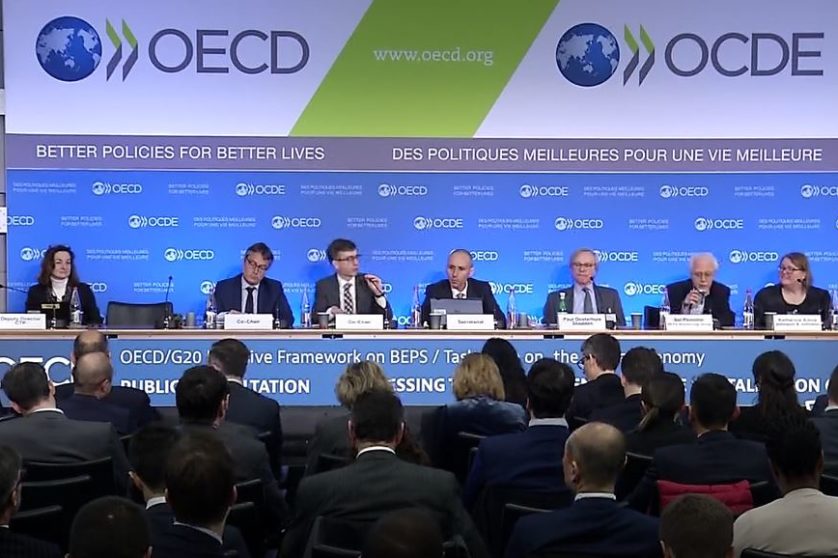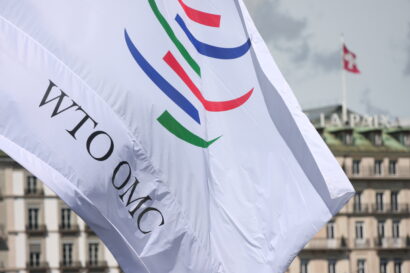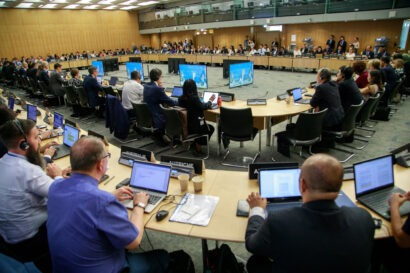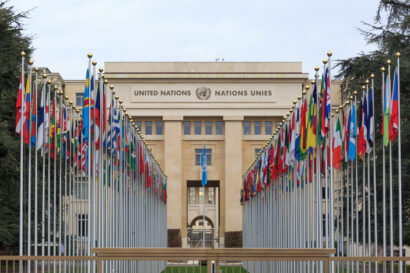The international tax event of the year took place on the 13-14th of March in Paris. It was the public consultation on Tax Challenges of Digitalisation of the Economy, organised for the Inclusive Framework on BEPS (Base Erosion and Profit Shifting), by the Organisation for Economic Cooperation and Development (OECD). For those who could not be there, the livestream video (all 14 hours of it!) is available on the OECD website. For those interested in my presentation of the submission of the BEPS Monitoring Group (20 minutes), you can watch it below or on YouTube. Another presentation from a developing country viewpoint was made by Joy Ndubai on behalf of the Tax Justice Network.
The BEPS project so far
It is now six years since the OECD published its Action Plan for the BEPS project, endorsed by the G20 leaders in the Tax Annex to their St Petersburg Declaration of 2013. The mandate from the G20 was for reforms to international tax rules to ensure that multinational enterprises (MNEs) could be taxed ‘where economic activities occur, and value is created’. The Action Plan was the first general re-examination of international tax system since it was devised nearly a century ago.
Regrettably, however, the first phase of the BEPS project, the package of reports released in October 2015, produced mainly a patch-up of existing rules. We analysed these limitations, and argued for a different approach, particularly in this book. The main achievement of the BEPS project was the creation of a system for country-by-country reports by the largest MNEs (over €750m turnover). This for the first time will give tax authorities an overview of each MNE as a whole, including a list of all its affiliates and data on its assets, income, revenues, tax paid and employees in each country. Collection and sharing of CbCRs has begun, although not yet by all countries, and it’s hard for developing countries to participate in the system. A better solution would be publication of these reports, since they do not contain commercially confidential information, and this should be on the agenda when the system is reviewed in 2020.
In 2016, participation in the BEPS project was extended to all countries willing to accept existing commitments and engage in the continuing work, through an Inclusive Framework on BEPS, which now has reached 129 members. The main continuing issue was the work on Addressing the Tax Challenges of Digitalisation of the Economy. Although this was Action 1 of the BEPS project, only an analysis of the problem was produced in 2015, and a new deadline of 2020 was agreed for this work. This failure to agree multilateral action meant that states initiated unilateral measures, such as the UK’s Diverted Profits Tax of 2015, India’s ‘equalisation levy’ on digital advertising of 2016, and digital services taxes proposed by several states, such as France, Italy and the UK. This led to renewed pressure from the G20, which led to an interim report in 2018 promising long-term solutions in 2020. The US international tax reform of December 2017 created a better basis for convergence, by bringing US rules more into line with other countries.
The 2018 interim report showed that a new approach is needed for both the central concepts of international tax: the threshold for taxable presence or ‘nexus’, and the criteria for allocation of MNE income. An important meeting of the Inclusive Framework (IF) on 23 January 2019 approved a Policy Note, explained in a bit more detail in a consultation document of 13 February. This outlined four proposals under two pillars: three proposals concerned the rules on profit allocation and nexus, while the fourth outlined a global anti-base erosion proposal for a type of minimum tax. The responses to this document were the focus of the public consultation a month later.
A new mood for reform
This consultation was markedly different from the many I have attended until now in the BEPS process. To begin with, although tax advisers comprised some 80% of the participants, there was for the first time a significant number of independent academics and researchers from civil society present.
Next, there was a different mood on the business side, as signalled in the opening session by Will Morris on behalf of Business at the OECD. He said that they accepted the need for change and for constructive engagement, despite their concerns. This was counterpointed by Pierre Habbard, on behalf of trade unions and civil society, who called for a radical reform to design clear and simple rules for allocating income and tax based on treating MNEs in accordance with the economic reality that they behave as single enterprises, instead of the outdated independent entity principle, which encourages the creation of complex fragmented corporate structures, to avoid both tax and labour regulation. In the ensuing debate, however, some of the tax advisers present pushed back, attempting a final defence of the existing methods.
The third new element was the increased emphasis on tailoring reforms to the needs of developing countries. This began with a submission from the G24 developing countries to the Inclusive Framework meeting in January, drafted by Colombia, Ghana, and India. This important intervention formed the basis for the third proposal in pillar 1 of the consultation paper, and it was reinforced by a public submission from the G24 on that paper. Next, the International Monetary Fund (IMF) published a policy paper Corporate Taxation in The Global Economy, that had been discussed by its Executive Board on 21 February. The paper was an overview and powerful analysis of the problems of the current system and possible solutions, arguing for special attention to the needs of low-income countries, and for solutions to ensure ease of administration and compliance and hence ensure greater certainty for business in taking investment decisions. Released a few days before the consultation, and spotlighted by an opinion piece (paywall) by IMF chief Christine Lagarde, this was a further reminder that the issue concerned poor countries as much or more than the richer OECD members (See also her IMF blog from today). Finally, the World Bank pitched in with its own submission to the consultation, again bringing out the perspective of developing countries.
.@Lagarde at @PIIE : I believe we need to create a #CorporateTaxation system that reflects the changes in the global economy. We need new rules. Why? Here are three reasons: https://t.co/WxwzZL4WlD pic.twitter.com/FH9bSxkKll
— IMF (@IMFNews) March 25, 2019
Next steps
The OECD secretariat will now draft a report, under supervision of the Steering Group of the Inclusive Framework, for eventual approval by the full meeting of the IF in May, and by the G20 Finance Ministers in early June. This is intended to outline a Work Program, for detailed technical work to be done through the Working Parties of the Committee on Fiscal Affairs (expanded to include IF members), and the Task Force on the Digital Economy.
What is now needed is to establish a roadmap for reforms. It’s clearly impossible to redesign basic international tax rules in a year or eighteen months, but this should not be an excuse for another patch-up compromise. A more general approach could take account of the specific suggestions that have been made. Such an approach was put forward in a submission to the consultation by the BEPS Monitoring Group, a network of independent researchers (including several working with the ICTD), which proposed a combination of principles and pragmatism in charting a way forward.
Under Pillar 1 in the discussion paper the first proposal, arguing for new rules to recognise value creation due to ‘user participation’, was criticised by many during the consultation for ‘ring-fencing’ some specific highly digitalised business models. Reforms should clearly go beyond this, but a wider approach could incorporate this factor. Similarly, the second proposal, conceding that income should be allocated to ‘market’ jurisdictions to take account of the value of marketing intangibles, could also be subsumed into a wider approach. Many commentators in the debate, especially from civil society, as well as others such as a Spanish think-tank, considered that the best basis for a more comprehensive solution lay in the third proposal, originating from the G24. This argued for a new nexus rule based on significant economic presence, and a balanced allocation of income using both supply and demand factors.
The concept outlined under pillar 2 of the discussion document for a global anti-base-erosion minimum tax was also supported in the IMF policy paper. If well designed, it could act as a brake on harmful tax competition, but a poorly designed measure could have the reverse effect. A way could and should be found to combine the proposals, formulated in the discussion document as different provisions applying to inbound and outbound investment, into a single measure. This would make the scheme non-discriminatory, and hence more likely to be compatible with EU law. It’s also important to focus on identifying the appropriate tax base of ‘diverted’ income, by devising a suitable ‘substance’ test. This would allow each country to apply its own tax rate to such diverted income, rather than attempting to agree a minimum tax rate applicable globally.
A key issue will be finding a way to move forward without the need for global consensus, which could brake progress to the pace of the most reluctant state. For the rules on allocation of income, fortunately, significant changes are possible even within existing tax treaty rules. The Transfer Pricing Guidelines would need rewriting, but this is long overdue: they have become complex and increasingly obscure after successive revisions, and they are anyway based on unsuitable foundations.[1] It would be desirable to agree a revised nexus rule based on the concept of significant economic presence, but if this proves hard to achieve, withholding taxes could provide a substitute, and put pressure on reluctant states to join a consensus. The anti-base-erosion minimum tax could be adopted unilaterally (similar provisions were part of the US reforms of 2017), but this should preferably be done on a joint basis by a coalition of states.
Above all, negotiators should now seek sustainable solutions based on clear and appropriate principles, looking beyond current preoccupations and short-term considerations. The current rules were devised nearly a century ago, and their overhaul should aim to make them fit for the 21st century.
[1] For a historical account see ICTD Working Paper 86, Problems of Transfer Pricing and Possibilities for Simplification (2018).



